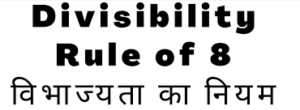The divisibility rule for 8 is a guideline to determine if a given number is divisible by 8 without performing long division.

Here’s how the divisibility rule for 8 works:
- Take the last three digits of the number you want to check for divisibility by 8.
- If these three digits form a number that is divisible by 8, then the original number is also divisible by 8. Otherwise, it is not divisible by 8.
Let’s illustrate this rule with an example:
Example: Determine if the number 4,608 is divisible by 8.
- Take the last three digits of the number: 608.
- Since 608 is divisible by 8 (608 ÷ 8 = 76), the original number 4,608 is also divisible by 8.
Now, let’s try another example:
Example: Determine if the number 1,345 is divisible by 8.
- Take the last three digits of the number: 345.
- Since 345 is not divisible by 8 (345 ÷ 8 = 43 remainder 1), the original number 1,345 is not divisible by 8.
Note: If the given number has fewer than three digits, you can simply check if the number itself is divisible by 8.
By applying this divisibility rule, you can quickly determine if a given number is divisible by 8. It is a helpful technique to simplify divisibility checks and perform quick mental calculations.
Important Links